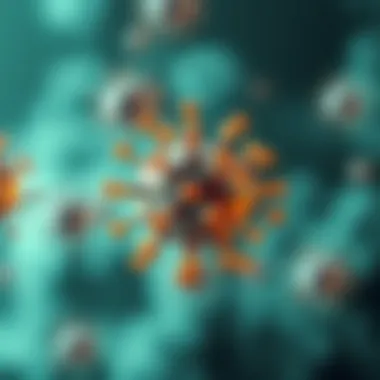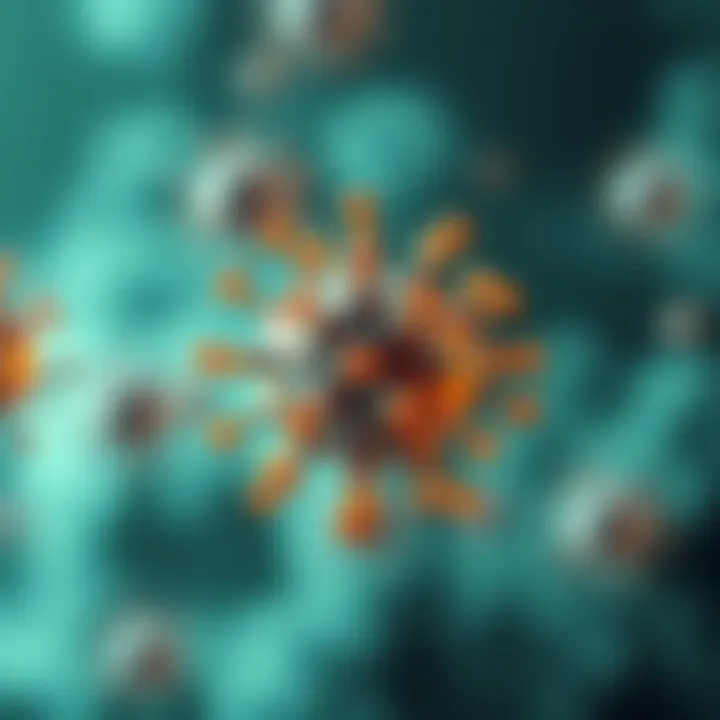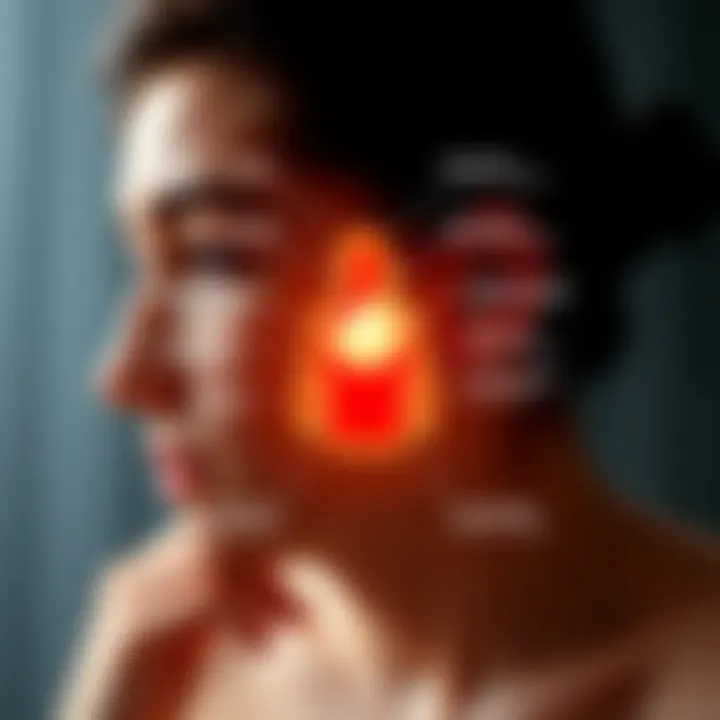Understanding Zinc: Dosage, Functions, and Health Effects


Intro
Zinc often flies under the radar in discussions about nutrient essentials, yet it plays a monumental role in our health. Picture it as a cornerstone, undergirding multiple bodily systems. Not just a mere supplement, zinc is a fundamental player involved in everything from immune function to DNA synthesis. When discussing a dosage of 66 mg, we delve deeper into the impact it has on bodily functions and overall health. In this exploration, we will consider not just the benefits, but also the pitfalls of both deficiency and excess.
This guide aims to illuminate the paths through which zinc operates within human physiology. It serves as a comprehensive roadmap, not only detailing the significance of this mineral but also dissecting how much should be consumed, where it can be sourced, and the repercussions of not hitting the mark on dosage. Whether you're a student grappling with nutritional science or a health professional looking to brush up on dietary guidelines, the information presented here will hopefully set the record straight about this vital nutrient.
Preamble to Zinc
Zinc is a trace element that plays a pivotal role in numerous biological functions. Despite its small existence in required quantities, its impact on bodily health cannot be overlooked. For students, researchers, and educators, understanding zinc is crucial as this mineral is integral to cellular function, immune response, and overall metabolic processes. Particularly in a world where dietary insufficiencies are prevalent, grasping the roles and recommendations for zinc is essential for implementing effective health strategies.
Definition and Chemical Properties
Zinc, represented by the symbol Zn on the periodic table, is classified as a transition metal. It has an atomic number of 30 and is known for its bluish-white color. This metal exhibits unique chemical properties; it combines with other elements and compounds, yet stands out due to its resistance to corrosion. Unlike some other metals, zinc is relatively low in electropositivity, which adds to its stability in biological systems. It exists in various oxidation states, with +2 being the most common in biological contexts. In plain terms, zinc shows versatile chemical behaviors that allow it to take part in several biochemical pathways, binding with proteins and assisting enzymatic reactions.
Historical Context of Zinc Research
The journey of zinc research can be traced back to ancient civilizations. Early findings showcased zinc in metallurgy, notably in the production of brass around 1000 B.C. However, it wasn't until the 20th century that its biological significance gained recognition. Through various studies, researchers discovered that zinc deficiency can lead to numerous health issues, particularly affecting the immune system and growth in children.
In the 1960s, scientists observed a correlation between zinc levels and immune function, laying the groundwork for future studies aimed at elucidating zinc's extensive roles in human health. To this day, ongoing investigations in both clinical and experimental settings continue to expand our understanding of how adequate zinc supply supports health and prevents disease. Thus, the narrative of zinc research reflects a gradual unveiling of its complex roles in human physiology.
"Zinc is not just a metal; it's a cornerstone of vibrant health, influencing every aspect of our well-being."
Through these insights into zinc, we can appreciate the importance of maintaining adequate levels in our diets for optimal health outcomes.
Essential Functions of Zinc in the Body
Zinc is far more than just a trace element in our bodies. It plays pivotal roles that are intricately linked to overall health and well-being. Understanding these essential functions is critical, especially regarding how zinc interacts with numerous biochemical pathways. This section delves into the significance of zinc in our biological processes, emphasizing its role in immune function, cellular metabolism, and protein synthesis.
Role in Immune Function
Zinc is often dubbed as an ally of the immune system, and for good reason. The mineral is crucial for the development and function of various immune cells, including neutrophils, macrophages, and natural killer cells. These cells act as the body’s frontline soldiers against infections and diseases.
- Boosting Immune Response: Zinc helps modulate the immune response by influencing the production of signaling molecules, known as cytokines, which regulate inflammation and immune responses. A sufficient level of zinc enables a quicker and more effective response to pathogens.
- Antioxidant Properties: Zinc acts as an antioxidant, helping neutralize free radicals that could cause oxidative stress. This stress is associated with several chronic conditions, including cancer and cardiovascular disease. By reducing oxidative stress, zinc supports a healthier immune function.
- Deficiency and Vulnerability: When zinc levels fall short, the immune system often struggles. Increased susceptibility to infections, delayed wound healing, and in some cases, autoimmune diseases may arise from zinc deficiency.
It is clear that maintaining adequate zinc levels is essential for robust immune function and overall health.
Importance in Cellular Metabolism
Zinc has a hand in various metabolic processes that are crucial for cellular function. Every cell in the human body requires zinc, primarily due to its role as a cofactor for more than 300 enzymes involved in diverse biochemical reactions.
- Energy Production: Zinc is essential in the process of carbohydrate metabolism, which is vital for energy production. It contributes to converting food into usable energy, thereby maintaining robust cellular operations.
- DNA Synthesis and Repair: In cellular division and growth, zinc plays a leading role in DNA synthesis. Without adequate zinc, the entire process can be inhibited, potentially leading to malfunctions in cell growth and replication.
- Enhancing Enzymatic Reactions: Zinc is fundamental in various enzymatic reactions, such as protein digestion, nucleic acid metabolism, and even the synthesis of hormones like insulin. By influencing these processes, zinc ensures that cells perform optimally for your body’s needs.
Ultimately, the contributions of zinc to cellular metabolism are multifaceted, making it a mineral of utmost importance.
Contribution to Protein Synthesis
Considered one of the building blocks of life, proteins are synthesized in every cell, and zinc is integral to this process. It not only supports protein synthesis but also influences the expression of genes that govern this activity.


- Enzymatic Function in Protein Production: Zinc is involved in synthesizing structural proteins, enzymes, and hormones. It is a critical player in signaling pathways that affect how proteins are built and modified.
- Cellular Repair: Protein synthesis is not just about growth; it’s also essential for repair. When tissues are damaged due to injury or stress, zinc aids in synthesizing proteins that rebuild and restore those tissues.
- Regulation of Gene Expression: Zinc finger proteins, which are dependent on zinc, bind to specific DNA sequences and regulate gene expression related to protein synthesis. This regulatory mechanism ensures proteins can fulfill their diverse functional roles within the cell.
In summary, zinc's contribution to protein synthesis underscores its importance. The efficiency of cellular processes directly ties back to the availability of zinc, pointing to a mineral that is indispensable to our health.
Sources of Zinc in the Diet
The significance of sourcing zinc from the diet cannot be overstated. Zinc is a critical mineral that supports numerous bodily functions, and understanding where to obtain it reliably enhances our dietary choices and overall health. This section will highlight the various sources of zinc, including both animal and plant-based options, and examine their respective advantages and disadvantages. Knowing these sources allows individuals to tailor their diets effectively to meet zinc requirements.
Animal-Based Sources
Animal-based foods are among the richest sources of zinc, making them a substantial part of a healthy diet. Foods such as beef, lamb, pork, and poultry are not just protein powerhouses but also provide a readily absorbable form of zinc. It’s interesting to note that red meat, particularly beef, holds the title for providing the highest concentrations of zinc, ensuring that those who consume it can meet their daily needs with relatively less effort.
Moreover, seafood like oysters is another powerhouse. In fact, they contain more zinc per serving than any other food. This delectable shellfish can provide a whopping 74 mg of zinc in just a 3-ounce serving, making it a boon for anyone aiming to boost their intake. Other seafood options such as crab and lobster also contribute to zinc consumption, albeit in lesser amounts.
The general advice is to include a serving of animal protein a few times a week to reap the benefits of zinc. However, those who lean towards plant-based diets should be mindful of getting adequate zinc through alternative sources, which leads us to the next subsection.
Plant-Based Sources and Bioavailability
Plant-based sources of zinc, though available, do require a bit more awareness due to bioavailability issues. In simpler terms, this means that while plants contain zinc, our bodies may not absorb it as efficiently as zinc from meat. This discrepancy is largely due to the presence of phytates in many plant foods. Phytates can inhibit the absorption of zinc, rendering the mineral less accessible.
Common plant-based sources of zinc include legumes like chickpeas and lentils, nuts and seeds, especially pumpkin and sesame seeds, and whole grains such as quinoa and oats. For those who follow strict vegetarian or vegan diets, it becomes crucial to incorporate these foods strategically.
It’s also worth noting that certain cooking methods can enhance the bioavailability of zinc from plants. For instance, soaking and sprouting beans, grains, and seeds can significantly reduce phytate content, aiding zinc absorption. This means that with a little culinary creativity, those following a plant-based diet can still meet their zinc needs effectively.
"Incorporating both animal and plant sources of zinc, while considering absorption factors, can lead to a balanced and effective dietary strategy for optimal health."
Zinc Dosage Recommendations
Understanding the right dosage of zinc is crucial for optimizing health. Zinc is often touted as a miracle mineral, pivotal in numerous bodily functions but, much like the Goldilocks phenomenon, too little or too much can lead to complications. Striking the right balance of zinc intake can enhance immune health, support metabolic processes, and contribute to cellular repair. Given the complex interplay between various nutrient needs across different demographics, dosage recommendations must be precise and well-informed.
Daily Recommendations by Age and Sex
Zinc needs vary significantly based on age, sex, and life stage. The National Institutes of Health (NIH) outlines specific recommended dietary allowances (RDAs) that help clarify these needs:
- Infants (0-6 months): 2 mg/day
- Children (1-3 years): 3 mg/day
- Children (4-8 years): 5 mg/day
- Males (9-13 years): 8 mg/day
- Males (14-18 years): 11 mg/day
- Adult Males: 11 mg/day
- Females (9-13 years): 8 mg/day
- Females (14-18 years): 9 mg/day
- Adult Females: 8 mg/day
- Pregnant Women: 11 mg/day
- Lactating Women: 12 mg/day
This spectrum of recommendations reflects how growth periods, hormonal changes, and life stages can influence the body's requirement for zinc. When assessing these needs, it’s also worth noting that factors such as diet, absorption rates, and lifestyle can complicate the picture. Not all individuals are created equal; some might absorb zinc more readily than others.
Zinc Supplementation and Dosage of mg
Specific dosages of zinc supplements can serve as a double-edged sword. Many over-the-counter products tout high dosages, such as the often-mentioned 66 mg. However, taking such amounts can lead to unintentional consequences. The medical community generally advises against exceeding the upper intake level of 40 mg for adults in any form unless closely supervised.
Zinc supplements at 66 mg may be useful in certain medical contexts, particularly for deficiency correction or managing chronic conditions where zinc levels are critically low. However, exceeding the recommended intake should be approached with caution. An excess of zinc can lead to symptoms such as nausea, headaches, and even interfere with the absorption of other essential minerals like copper and iron.
Health Implications of Zinc Deficiency
Zinc deficiency is a silent saboteur of health, affecting multiple bodily functions and leading to a range of adverse outcomes. The importance of understanding how zinc deficiency can manifest in the body is paramount. It not only highlights the need for adequate dietary zinc intake but also emphasizes the broader implications for health and wellbeing. In this section, we'll delve into the signs and symptoms individuals may encounter, as well as the potential repercussions of insufficient zinc on growth and development.


Symptoms and Signs of Deficiency
Recognizing the symptoms of zinc deficiency can often be tricky, as they may overlap with other health issues. However, certain signs are quite telling. Individuals might experience:
- Immune dysfunction: Frequent infections and illnesses can signal immune system troubles tied to low zinc levels.
- Delayed wound healing: Cuts and scrapes may take longer than usual to heal.
- Hair loss: Thinning hair or patches of hair loss could point to a deficiency.
- Skin issues: Conditions like eczema or dry skin can arise due to inadequate zinc.
- Taste and smell impairment: A loss of these senses is not just bothersome but can affect overall quality of life.
These symptoms can be subtle but together can paint a broader picture of an underlying zinc deficiency, necessitating timely intervention to prevent further complications.
Impact on Growth and Development
Zinc's role in growth and development is critical, especially during childhood and adolescence. This trace mineral is an essential player in several processes:
- Cell division and growth: Zinc is integral for DNA synthesis, playing a vital role in cell division. A deficiency can hinder proper growth in children and adolescents.
- Neurological development: Sufficient zinc levels are necessary for brain health and cognitive functions. Low levels can result in cognitive deficits or affect behavior.
- Reproductive health: In growing adolescents, zinc supports sexual maturation. Deficiency can impact hormonal balance and reproductive functions, leading to delayed puberty.
In summary, zinc deficiency doesn’t just pose immediate health risks; its long-term implications can be profound, affecting everything from cognitive abilities to physical development. Ensuring adequate zinc intake throughout life is paramount in mitigating these risks and promoting ongoing health.
Health Risks of Excess Zinc
Zinc is a crucial element that our bodies require for various functions; however, similar to many substances, too much of a good thing can lead to health complications. Understanding the health risks of excess zinc is essential to maintaining a balanced approach to supplementation and dietary intake in this context. High levels of zinc may cause toxicity, resulting in a range of symptoms that can adversely affect one’s overall wellbeing. Moreover, it can lead to interference with the absorption and metabolism of essential nutrients, highlighting the importance of moderation.
Toxicity Symptoms and Management
When the body receives too much zinc, particularly from supplements, it can result in toxicity. The symptoms usually manifest in both acute and chronic forms. Some of the most common signs include:
- Nausea and Vomiting: These can serve as immediate reactions to excess zinc, creating discomfort and distress.
- Diarrhea: Another gastrointestinal symptom that suggests one's body is struggling to process the high levels of zinc.
- Stomach Cramps: Discomfort in the abdomen can occur as the digestive system reacts.
- Headaches: Excessive zinc can affect the central nervous system, illustrating its broad impact on health.
- Reduced Immune Function: Ironically, while zinc is pivotal for immune health, excessive amounts can actually suppress immune responses, which is counterproductive.
In the worst cases, prolonged exposure to high zinc levels can lead to more severe complications, such as kidney damage and disrupted copper balance, which can have a cascading effect on health.
The management of zinc toxicity involves several approaches:
- Discontinuation of Supplementation: Identifying the source of excess intake and stopping it can be the initial step.
- Fluid Rehydration: Keeping the body hydrated is vital to help flush out the excess zinc.
- Medical Intervention: In severe cases, one might require hospitalization, where healthcare professionals may administer treatments to manage symptoms and reduce zinc levels in the body.
Interactions with Other Nutrients
An often overlooked aspect of excess zinc is its potential interactions with other nutrients, which can further complicate its effects on health. High zinc intake can impact the absorption and balance of several important elements in the body, including:
- Copper: Zinc competes with copper for absorption in the intestines. Excessive zinc may lead to a deficiency in copper, resulting in symptoms like anemia and weakened immune function.
- Iron: Similar to copper, excess zinc can interfere with iron absorption, which could lead to iron deficiency anemia over time.
- Calcium: Studies have shown that high zinc levels can disrupt calcium absorption, potentially leading to bone density issues over time.
These interactions highlight the importance of dietary balance, illustrating how too much zinc can inadvertently create nutritional gaps that may need addressing. Thus, it's crucial to approach zinc intake cautiously, considering one's overall dietary landscape to avoid tipping the scales from health to risk.
Zinc and Chronic Disease Management
Chronic diseases such as cardiovascular issues and diabetes are increasingly prevalent in modern society. Understanding the connection between zinc and these conditions can provide valuable insights into disease management. Zinc plays a multifaceted role in maintaining health and providing potential therapeutic effects for those suffering from chronic ailments.
Role in Cardiovascular Health
Zinc's involvement in cardiovascular health is noteworthy. This mineral is crucial for several physiological functions relevant to heart health. For starters, zinc acts as an antioxidant, helping combat oxidative stress that can lead to cardiovascular diseases. Studies suggest that adequate zinc levels might help maintain proper endothelial function, which is vital for vascular health.


A strong relationship exists between zinc deficiency and an increased risk of hypertension. High blood pressure, a major risk factor for heart disease, correlates with the lack of this critical mineral. Moreover, zinc contributes to lipid metabolism, influencing cholesterol levels in the blood. Ensuring adequate zinc intake could therefore play a preventive role against atherosclerosis and other heart-related issues.
- Key points about zinc and cardiovascular health:
- Antioxidant properties combat oxidative damage
- Supports endothelial function for healthy blood vessel operation
- Influences lipid levels, potentially lowering heart disease risks
"Zinc not only supports heart function but may also provide protective effects against diseases caused by oxidative stress."
Influence on Diabetes Management
Diabetes management is another area where zinc demonstrates potential benefits. Research indicates a strong link between zinc deficiency and insulin resistance, a pivotal factor in Type 2 diabetes. Zinc is involved in the production, storage, and Release of insulin from the pancreas, which points to its critical role in glucose metabolism. Thus, maintaining an adequate level of zinc can enhance insulin's effectiveness in the body.
Moreover, zinc may play a role in mitigating complications related to diabetes. For instance, it has been suggested that zinc can improve glycemic control and potentially reduce the risk of diabetic neuropathy. Some studies have shown that supplementation with zinc can lead to improvements in fasting glucose levels and HbA1c, a key marker for long-term glycemic control.
- Essential aspects regarding zinc in diabetes management:
- Enhances insulin secretion and action
- Aids in lowering blood sugar levels
- May reduce complications associated with diabetes
In summary, zinc holds promise in the management of chronic diseases such as cardiovascular health and diabetes. Its antioxidative properties, along with its involvement in insulin and glucose physiology, underscore the need for adequate zinc intake in promoting better health outcomes.
Zinc in Research and Future Directions
As we dive into the realm of zinc, the exploration goes beyond its foundational roles and essential functions; this section sheds light on the innovative frontiers being explored in zinc research. With advancements in science, understanding how zinc plays multifaceted roles in health opens doors to potential therapies and nutritional strategies. Researchers are becoming more aware of zinc's significance, not just as a dietary mineral but also as a pivotal player in managing various health conditions and influencing overall wellness. This narrative will highlight the current hot topics in zinc research, focusing on recent studies and the future potential applications of supplementation designed to radically enhance human health.
Recent Studies on Zinc Supplementation
Recent investigations into zinc supplementation have shown promising results, fueling further interest in the mineral’s role in health management. For instance, a study published in the journal Nutrients reports that zinc supplementation can significantly reduce the duration and severity of upper respiratory infections. It suggests that adults taking regular doses of zinc could see marked improvements in immune system functionality, particularly during colder months when cold and flu season is at its peak.
Moreover, researchers are looking into how zinc supplements can aid in cognitive function and mental health. A study in Frontiers in Aging Neuroscience provides insights that highlight the potential neuroprotective effects of zinc, particularly in older adults. Participants who maintained adequate zinc levels displayed a slower cognitive decline compared to those with deficiencies. This unveils a deeper layer of zinc's role in neurological health, indicating that maintaining appropriate zinc levels might not just safeguard physical health but also bolster brain health as we age.
Notably, it's also crucial to keep an eye on zinc’s interactions with other supplements. Excessive consumption of zinc may impede copper absorption, leading researchers to advocate for a balanced approach to supplementation. It’s recommended that while zinc is important, a concurrent assessment with another essential mineral, like copper, should be kept in check to avoid deficiencies.
"Zinc supplementation has shown promising results in reducing duration and severity of infections, revealing its critical role in immunity."
Potential Therapeutic Applications
The therapeutic potential of zinc goes beyond treating deficiencies; it's now being evaluated in various medical conditions. One such focus is its anti-inflammatory properties. Zinc seems to play a role in regulating oxidative stress in the body. A particular study found that patients with chronic inflammatory conditions may benefit from added zinc, as it helps manage inflammatory processes effectively.
Moreover, zinc's power in wound healing cannot be overstated. Individuals with wounds often experience prolonged healing, partly due to insufficient zinc levels. Zinc is currently being investigated as a therapy to enhance recovery rates post-surgery and in chronic wound cases. Its properties assist in cell division and protein synthesis, both necessary for tissue repair and recovery.
In the realm of chronic disease, ongoing research is also evaluating zinc's role in diabetes management. Studies hint that proper zinc levels might enhance insulin action and secretion. This connection opens a promising path for therapeutic interventions aimed at managing diabetes more efficiently, hinting that a daily intake of zinc could serve as a powerful ally in combating this global epidemic.
These potential applications underscore that while zinc might be perceived as just another mineral, its rich profile in human health research signals the need for more attention from scientists, healthcare providers, and the general public alike. While we await conclusive results from ongoing studies, the implications for zinc's use in clinical settings highlight a shift towards recognizing its value within holistic health management.
Ending
Zinc is not just a minor player in the grand symphony of human health; it holds the baton, coordinating several vital functions in our bodies. As we've uncovered throughout this article, understanding zinc’s role is crucial for both individuals and health professionals alike. It can be the difference between a flourishing immune response and a body susceptible to infections.
When looking at the recommended dosage of 66 mg, it’s vital to recognize that this is not just a number. It reflects a well-balanced approach to nutrition that considers age, gender, and individual health conditions. In fact, an adequate intake helps sustain cellular processes, protein synthesis, and even cellular metabolism.
Consider the broader implications. Zinc deficiencies can lead to a cascade of health issues ranging from impaired growth in children to chronic illnesses in adults. Conversely, excess zinc intake can result in toxicity, showcasing the need for balance in dietary habits.
"Zinc is like the glue that holds the many facets of our health together. Too much or too little can lead to a shaky foundation."
The research and future directions in zinc supplementation hint towards some exciting potential therapeutic applications. Ongoing studies might soon unlock even more about zinc's capabilities, perhaps paving the way for innovative treatments for chronic diseases. As the body of research grows, it will be imperative for educators, trainers, and healthcare professionals to guide patients through the stormy waters of diet and supplements.







